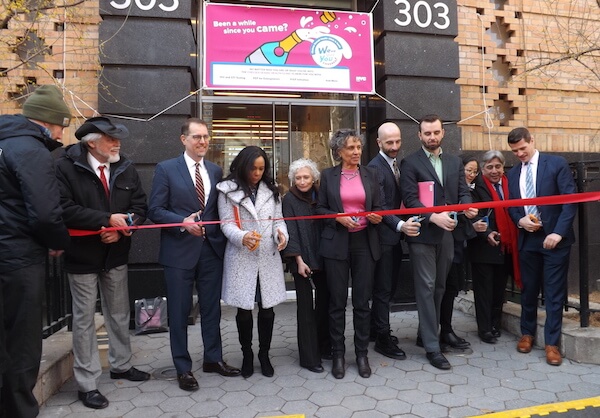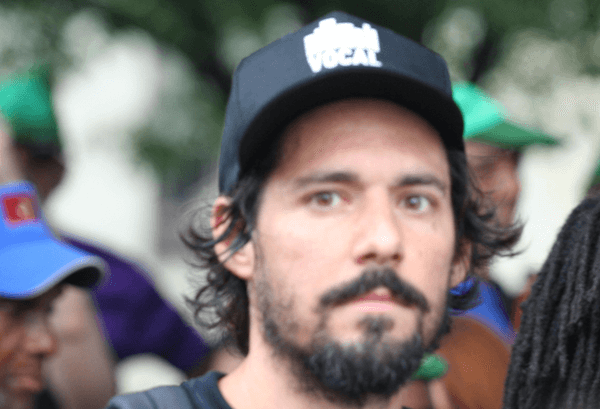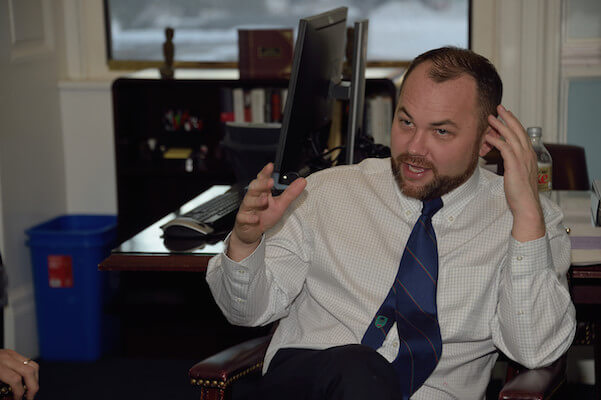Jeff Sessions at the White House with President Donald Trump on February 9, the day the attorney general was sworn in. | WHITEHOUSE.GOV
It’s a question of will; you want to solve the drug problem, give them the max, says Jefferson Beauregard Sessions III, the man Donald Trump chose to be his attorney general. In line with that thinking, Sessions is torpedoing a three-year experiment that encourages leniency before its impact could be examined.
Sessions’ recent memo to U.S. attorneys nationwide demanded that criminal charges be determined by the weight of the drug seized.
Wasting no time in responding to the AG, California’s new Democratic US senator shot back that Sessions’ new approach is nothing more than the old policy of overcrowding the prison system by focusing on “the neighborhood street-level drug dealer, instead of addressing the core issues of addiction and getting folks into treatment.”
PERSPECTIVE: The Long View
Speaking to a conference of the Center for American Progress, Kamala Harris warned, “That is not justice. That is not smart on crime.”
Then she got fierce: “I believe we have to stop this.”
The newly emerging consensus about drug use was succinctly described years ago by the then-UN Secretary General Kofi Annan.
“Drugs have destroyed many people, but wrong policies have destroyed many more,” he said.
Government aggression is the biggest problem. Sessions’ approach defies the wisdom Annan and so many more have articulated.
In this century, 7,184 New York City residents have died from opioid overdoses. The number has been rising for six years. Last year, 1,075 died –– a total greater than the combined deaths from homicides and vehicular accidents.
The quickest way to reduce overdose death is by opening spaces where users consume drugs with sterile syringes that avoid the risk of infections and those who overdose get immediate help. When a person stops breathing, their window to stay alive is measured in minutes.
Safer consumption spaces solve this problem by having staff on hand with breakthrough medications like Naloxone to restore normal breathing.
Sessions’ right-wing ideas don’t play well in New York City, where the supporters of safer consumption spaces (SCS) have a far greater shot at impacting policy than the draconian inclinations of a former Alabama prosecutor.
Responding to Sessions’ dunderhead proposal, the New York Daily News ran a long story on May 20 about an outdoor shooting gallery on an abandoned railroad bed in the South Bronx. The News didn’t talk to the police, they talked to the drug users who wanted help but did seem as though they were ready for abstinence.
A SCS would move users out of this unsavory outdoor setting. Harm reduction advocates have a neat way of promoting this new service — by letting the public experience it, inside a pop-up Safer Consumption Space assembled in a hilly South Bronx park earlier this month. Fred Wright, a community organizer at VOCAL-NY — which advocates on behalf of people living with HIV as well as drug users and former inmates — did a presentation inside a green tent.
Those of us on hand entered a waiting room with a display of kits that help injecting users and smokers avoid infection and mouth sores. There was a tray filled with NYC-branded condoms with lube and pamphlets answering health questions useful to drug users.
Clean syringes were there, as well, but the room’s educational focus was not only on how to avoid HIV but also on preventing hepatitis C infection. Most drug users know about the importance of using sterile needles, but they seldom understand the importance of using sterile cookers, as well. Most drugs are dry; water must be added and then heated to create a solution that can be injected. Cookers that have been used over and over are at risk of becoming contaminated by the user’s body fluids. Ideally, cooking gear should be thrown out after one use. Educational intervention on this level could curb both HIV and hep C infection, and advice given in a SCS spreads quickly into the drug user underground.
The crack kit at the SCS includes a rubber stopper at the end of the pipe so lips don’t get burned and crack. The interlaced copper strands used in the kitchen scouring pad Chore Boy are pushed inside the pipe to filter the smoke so that melted particles don’t enter the lungs and cause serious damage.
Prohibition may force drug users to buy illegal substances with dangerous impurities, but ingenious public health advocates find ways to reduce infections and teach users new skills to protect their health.
“Harm reduction is about developing competencies,” said Joyce Rivera, executive director of St. Ann’s Corner of Harm Reduction (SACHR) a Bronx needle exchange that wants to open a safe consumption room as soon as officials permit it. (Full disclosure: I’m a former chair of St. Ann’s board.)
Successfully completing small steps — like using drugs in a health conscious way –– promotes self-confidence, affirming the drug users’ sense that they are capable of taking care of their health. This is a profound act of dissent, challenging the stereotype of users as helpless throwaways.
And it’s an approach light years away from Sessions’ faith in cruelty.
The railroad bed the Daily News reported on is a few blocks from St. Mary’s Park where VOCAL-NY and Boom Health, a multi-service program that offers needle exchange in the Bronx and elsewhere, set up the SCS green tent model. Boom Health has space nearby available for safer consumption, in the midst of a neighborhood that has the highest rate of opioid ODs in New York State.
The Daily News story pulls no punches in describing the area’s opioid crisis: “Its 2015 tally — 18.8 per 100,000 people — dwarfs the national rate of 4.1 per 100,000. If the neighborhoods were a state, it would trail only West Virginia in a ranking of those with the highest rates of all drug overdose deaths.”
The space is available, the agency is willing, the clients are ready. The only barrier is official approval.
The SCS approach costs a fraction of the expense of imprisoning a drug user-dealer, and from day one it stops OD fatalities.
City elected officials endorse resistance when it comes to Trump. In this year’s election, most face little opposition. This is a perfect moment for them join the resistance Sessions and his misguided crackdown with a call for safer consumption spaces.
“How many more have to die before you join the fight?” was an ACT UP rallying cry. Surely it applies to this epidemic of overdoses fatalities.



































